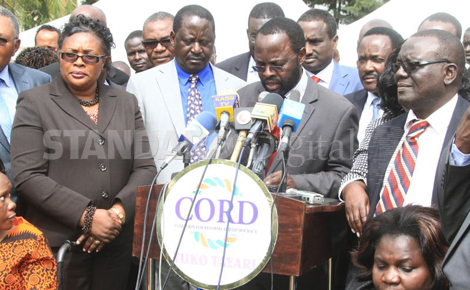 |
|
CORD leader Raila Odinga (second left), Kisumu Senator Anyang’ Nyong’o (third left), former Vice President Kalonzo Musyoka (second right) and other coalition o?cials address the Press during the Parliamentary Group meeting in Nairobi yesterday. [PHOTO: GOVEDI ASUTSA/STANDARD] |
NAIROBI, KENYA: In a bid to court mass support, movers of the twin parallel referendum push have drafted Bills that incorporate issues deliberately meant to either bait or appease key constituencies among the voting blocks.
The centrepiece for the governors’ and Coalition for Reforms and Democracy’s proposed referendums is scaling up allocation to counties to at least 45 per cent of national revenue collected in the preceding financial year - tactfully intended to resonate with voters as it is seen as more funding to grassroots development.